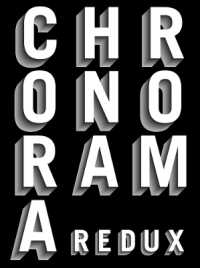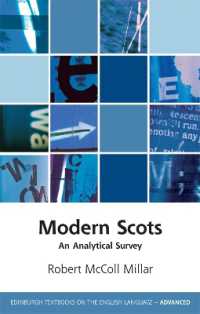- ホーム
- > 洋書
- > 英文書
- > Business / Economics
Full Description
This is an open access title available under the terms of a CC BY 3.0 IGO International licence. It is free to read at Oxford Scholarship Online and offered as a free PDF download from OUP and selected open access locations.
The notion of development influences and is influenced by all aspects of human life. Social science is but one representational option among many for conveying the myriad ways in which development is conceived, encountered, experienced, justified, courted, and/or resisted by different groups at particular times and places.
As international development has become more quantitative and economics-centred, there is an enduring sense that what is measured (and thus 'valued' and prioritized) may have become too narrow, that the powers of prediction claimed by some areas of economics and management may have overreached, and that the human dimension is in danger of being lost.
Reflecting this concern, New Mediums, Better Messages? contributes to new conversations between science, social science, and the humanities around the roles of different kinds of knowledge, stories, and data play in relation to global development. It brings together a team of multidisciplinary contributors to explore popular representions of development, including music, blogs, and fiction.
Contents
David Lewis, Dennis Rodgers, and Michael Woolcock: Introduction: Innovations in translation, advocacy, and engagement in global development
Part I: Translation
1: David Lewis, Dennis Rodgers, and Michael Woolcock: The sounds of development: Musical representations as (an)other source of development knowledge
2: Danny Hoffman: The pedagogy of trash: Photography, environmental activism, and African dumpsites
3: Mark Ralph-Bowman: Writing a development play: 'The Soft Bulldozer', or the subtle smashing of self-empowerment
4: Hilary Standing: Entering the fictional world of development: Writers, readers, and representations
Part II: Advocacy
5: Duncan Green and Maria Faciolince: From poverty to power: A blogger's story
6: Jolene Fisher: Playing for change: Global development and digital games
7: Emily Le Roux-Rutledge: Women saving the world: Narratives of gender and development on global radio
8: Ben Jones: 'Being in the spotlight is not something that we are used to': Awkward encounters in The Guardian's Katine initiative
Part III: Engagement
9: Shahpar Selim: Allah megh de: Culture and climate struggles in Bangladesh
10: Caroline Sage: Contemporary arts festivals in Nigeria and Nepal: Reclaiming and reimagining development discourse
11: Sophie Harman: Who consumes? How the represented respond to popular representations of development
12: Patrick Kabanda: The arts in the economy and the economy in the arts

![Godzilla: Escape the Deadzone [Kai-Sei Era], Vol. 1](../images/goods/ar/work/imgdatag/97988/9798887244518.JPG)






